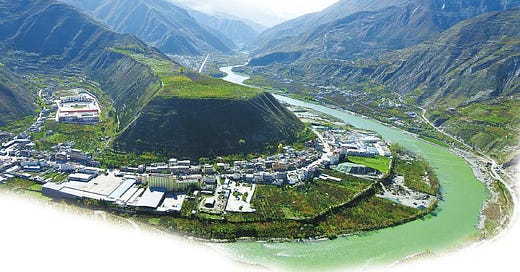Written on the Boat in Jiading (1) Zhang Wentao At Lingyun, on the western bank, The river babbles by the wall, Past the sandbar of Jiazhou, This ancient isle. Jumbled green reflections float But never wash downstream; I pole My boat to holy Mount Wuyou, Round all three sides. Written on the Boat in Jiading (2) The water of the Pingqiang rolls So distantly, so green and fresh, In ice-cold dreams of Mount Emei, Its snow unthawed. I love the thousand mountain folds Of old Hanjia; at every Marvelous vista on my way I rest my oars. 张问陶 嘉定舟中·其一 凌云西岸古嘉州,江水潺湲抱郭流。 绿影一堆漂不去,推船三面看乌尤。 嘉定舟中·其二 平羌江水绿迢遥,梦冷峨眉雪未消。 爱看汉嘉山万叠,一山奇处一停桡。
The Pingqiang River was an old name for what is now the River Min, flowing along the edge of the Sichuan plain. Mount Emei is the most important mountain in Sichuan, a centre for Buddhist pilgrimage for centuries. And Hanjia is another way of saying Jiading, which again means the central Sichuan area.
The profusion of place names in these little poems tells us something: the poet is luxuriating in the local landscape, and relishing the long history and associations that these names conjure up. But he does more than that: he also offers us specific details that make the scenery come to life for us as readers. In the first poem it was the Buddhist wisdom encoded into the landscape in the reflections on the water: the lightest, most unsubstantial thing, and yet the only thing the river can never wash away. In the second poem it is the indeterminate dream of coldness. The grammar of the line seems to hint that it is the river water dreaming of snow; our common sense tells us it must be the poet, presumably dreaming of snow because of the shocking coolness of the snowmelt river water.



